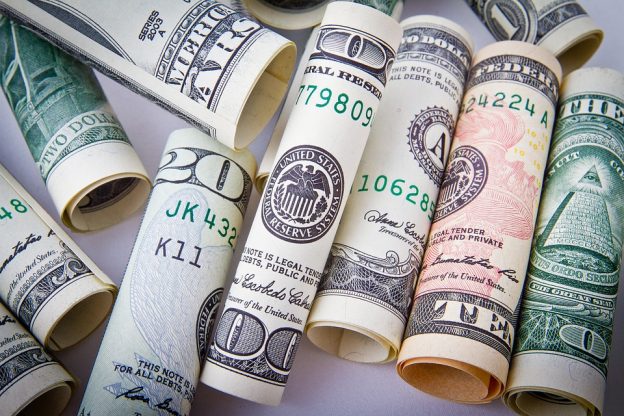Lear Capital Shares 3 Ways a Competing Reserve Currency Could Threaten the U.S. Dollar — and Cost Americans Cash
If the United States dollar were to lose its status as the world’s reserve currency, the resulting impact might surprise American consumers, says Kevin DeMeritt, founder and chairman of Los Angeles-based precious metals firm Lear Capital.
Although the U.S. dollar has been considered the de facto reserve currency on a global scale since World War II, the federal government hasn’t balanced the amount of currency it produces with the country’s gold reserves for several decades.

Photo/NikolayF.com
“If you go back prior to 1974 in the United States, we had to back a printed paper dollar with gold or silver — one or the other — and we don’t do that anymore,” Kevin DeMeritt says. “Now that we can print up as much money as the government, or the central bank, wants to, every dollar you print, the money that’s already out there becomes worth less and less. That’s what happens over time to paper currency.”
Only a finite amount of precious metal assets, however, are available globally, and production constraints restrict how much new gold is put into circulation on a regular basis. But with utilizations in electronics, jewelry, and other applications, as well as strong ongoing investment interest, historically, the demand for the gold has remained significant.
“[You] can only mine so much gold per year,” Kevin DeMeritt says. “That controls the supply, which is fairly limited. Put an increased demand on a fixed supply, the price typically goes up.”
The difference, according to DeMeritt, is evident in the value of gold today, compared to the way paper money has evolved.
“The value of gold in the early 1900s was $20,” the Lear Capital founder says. “If you had a $20 bill at that particular time, it’s worth 97% less [today]; yet that $20 in gold is worth $1,600.”
America’s Reserve Currency Role May Not Last Forever
According to the recent The Tipping Point report from Lear Capital, the five large BRICS countries — Brazil, Russia, India, China and South Africa, representing a whopping 40% of the global population — are reportedly working on establishing a collective currency, somewhat like the euro, which may be backed by gold.
Due to the geographically diverse array of goods and services that could be involved, that type of currency could garner interest, Lear Capital says. Together, those five nations have a gross domestic product that’s greater than the G7 countries, a group of leading industrial nations that includes Canada, France, Germany, Italy, Japan, the United Kingdom and the United States.
If a BRICS or other currency were to eventually nudge the U.S. dollar out of the reserve currency position, the consequences could be dire, Kevin DeMeritt says.
“People in the United States would have a gigantic wake-up call because things would become much, much more volatile,” he says.
The U.S. dollar losing the reserve currency status could affect American consumers’ financial situation in a number of ways — including the following outcomes.
Hefty Prices and Inflation
If the U.S. dollar was not considered to be the reserve currency, costs for crucial items, such as oil, could increase significantly, according to DeMeritt.
“It’s denominated in somebody else’s currency,” he says. “That currency goes up and down; [and] we would pay higher product prices, just like Europe’s been doing. Eight, nine years ago, [the cost of gas] was already very, very high — because their currency was not the reserve currency anymore; ours was — so there’s more volatility in those markets.”
If the demand for the U.S. dollar drops and the government prints and adds new bills into circulation in large quantities, that, too, could drive prices for domestic goods higher, according to Lear Capital. Similarly, the cost of imports could rise, due to widening trade deficits.
Wage Issues
Wages and yields don’t always adjust with inflation. If worker pay levels in the U.S. fail to accelerate in line with increases in inflation, a number of consumers’ spending power could be negatively affected.
Americans who are retired and living on a fixed income that’s drawn from sources such as investments, in particular, could feel the impact.
Challenges Saving Money
Inflation and higher prices can also drastically alter Americans’ ability to save money. Goods and services that cost more could eat away at current retirees’ nest egg at a more rapid rate than they’d expected.
Elevated costs can also limit the amount Americans who haven’t yet left the workforce can save.
“People should really think about their retirement accounts — especially if you believe inflation’s going to be a problem over the next five or six years,” Kevin DeMeritt says. “Because we don’t want your dollar bill to be cut in half in 10 years, and your retirement plans [to] evaporate along with it.”
Could a New Monetary Structure Push Precious Metals Values Higher?
There is at least one potentially positive outcome that could occur if a new contender were to emerge as the global reserve currency. If a gold-backed system were to be introduced and again become the norm, the demand for the precious metal could become even more intense, driving gold prices up even further.
According to Kevin DeMeritt, that might help offset inflation and ease some of the other investment challenges that could occur during the transition to a new reserve currency — and, at the same time, possibly increase the overall interest in physical gold investment assets.
“Gold is often seen as a pretty good hedge against inflation and tends to rise when the purchasing power of the dollar declines,” he says. “When investors are worried about the economy, usually, you get more people turning to gold — which can drive up its price. Gold has an incredible 5,000-year history of protecting purchasing power. Demand will continue to increase for precious metals as inflation remains high.”














